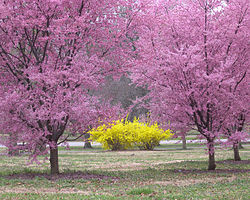This article needs additional citations for verification .(August 2011) |
| Grand Avenue, Grand Drive | |
 Grand Boulevard as it passes through the neighborhood of Tiffany between Interstate 44 and St. Louis University Medical Center | |
| Type | Thoroughfare |
|---|---|
| Owner | City of St. Louis |
| Maintained by | St. Louis City Street Department [1] |
| Length | 9.2 mi (14.8 km) [2] |
| Width | 5-7 lanes |
| Location | St. Louis, Missouri |
| Postal code | 63116, 63104, 63110, 63103, 63106, 63107, 63102 |
| Nearest metro station | Grand |
| South end | Holly Hills Avenue in Holly Hills |
| Major junctions | |
| North end | Hall Street in Near North Riverfront |
Grand Boulevard is a major, seven to five-lane wide, north-south thoroughfare that runs through the center of St. Louis, Missouri. It runs north through Carondelet Park in the south portion of the city to the Mississippi River north of the McKinley Bridge. It runs generally north-south, about midway between Forest Park and the Mississippi River. Neighborhoods that it runs through include Carondelet, Dutchtown, Tower Grove East, Tower Grove South, Compton Heights, Tiffany, Midtown, Jef-Vander-Lou, Fairground, and College Hill.

